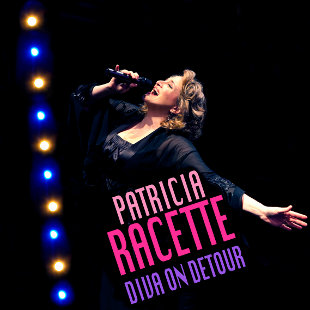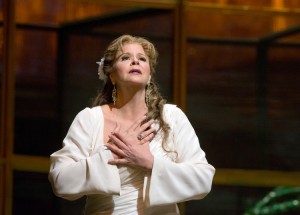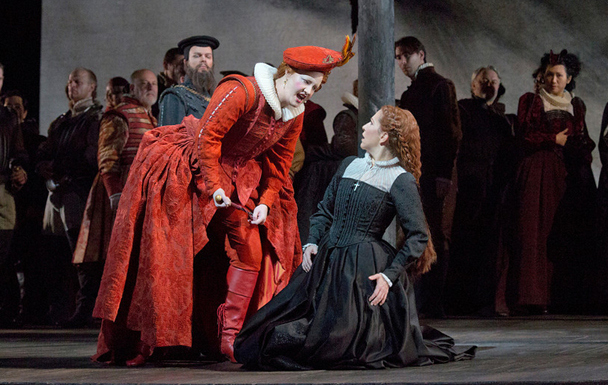 I love Patricia Racette. She’s one of the best singing actors I’ve ever seen on an opera stage. Her Blanche de la Force in Poulenc’s “Dialogues of the Carmelites” was incredible, and I’m looking forward to hearing her again in this work at the Met in May, this time as Madame Lidoine. Both her voice and her presence are warm and engaging—she’s superb at drawing the audience in, whether as a Puccini heroine, Verdi’s Leonora or Britten’s Ellen Orford, and she was especially touching in Tobias Picker’s underrated “An American Tragedy” several seasons ago.
I love Patricia Racette. She’s one of the best singing actors I’ve ever seen on an opera stage. Her Blanche de la Force in Poulenc’s “Dialogues of the Carmelites” was incredible, and I’m looking forward to hearing her again in this work at the Met in May, this time as Madame Lidoine. Both her voice and her presence are warm and engaging—she’s superb at drawing the audience in, whether as a Puccini heroine, Verdi’s Leonora or Britten’s Ellen Orford, and she was especially touching in Tobias Picker’s underrated “An American Tragedy” several seasons ago.
I always felt she should have had the type of career Renée Fleming has enjoyed (including the ad for Rolex). Certainly Racette would have been a far better choice for Carlisle Floyd’s “Susannah,” and I would love to see her do more at the Met—Marguerite and Desdemona are at the top of my list of roles I’d like to see her perform.
Her new project is an ambitious cabaret show called “Diva on Detour,” the recording of which was recently released. I’m a huge fan of cabaret, but I’m well aware that when opera singers take on this repertory, it’s really hit or miss (Eileen Farrell is of course the gold standard, though Dawn Upshaw and lately Stephanie Blythe are doing quite well with the American Songbook). Since Racette’s first career ambition was to sing jazz, I was curious as to how she’d sound in this type of music. The answer? At this point I’d give her a “B”—good but needs some improvement.
Here are the pluses: Patricia Racette’s cabaret voice is uncommonly rich, but without resorting to a stereotypical opera soprano sound. She does a great job with the Edith Piaf numbers, especially “Milord” and “Mon Dieu,” but her stylistic choice and/or key of “La Vie en Rose” is too heavy for the song. Perhaps not surprisingly she’s at her best when there’s a story to be told, as in “Guess Who I Saw Today?” featured in her “sad song” medley, and her marvelously bluesy “The Man That Got Away.” The minuses: I’m not crazy about some of the tempos (“So in Love” is far too driven), and I think her accompanist is a stiff.
Also, I would have liked the patter to be more informal and less instructive. I’ve heard Racette as a guest on the Metropolitan Opera Quiz, and she’s quick on her feet—funny and wonderfully opinionated. But we don’t get enough of this in “Diva on Detour,” except when she imitates her mother’s broad New Hampshire accent: “Patty! Why ahrn’t ya goin’ on ‘Stah Search’?” And after referring to “my man” several times in “I Got Rhythm,” there’s a sly and perfectly timed switch that rightly makes the audience crack up (Racette came out in an “Opera News” cover story ten years ago at a time when few opera singers, let alone sopranos singing romantic leads, did).
The bottom line? Nancy LaMott or Diana Krall she’s not, but Patricia Racette is interesting, no matter what she sings. With her intelligence and musicianship, the end result is always worth hearing.
______________________________________________________________________________________________
Speaking of divas with a pop streak, I enjoyed Marilyn Horne’s interview of Susan Graham on WQXR’s “Operavore” a few Saturdays ago. The mezzo-to-mezzo chat got really interesting when Horne asked Graham whether she had ever wanted to sing the soprano lead in music. I grinned when Graham replied that she had always preferred harmony—her teen-age career goal was to join the Manhattan Transfer. Susan Graham rocks.
______________________________________________________________________________________________
I want to thank my fellow blogger, The (notso) Secret Life of PhD Student , for nominating me for the Sunshine Award, which is:
… [A]n award given by bloggers to other bloggers. The recipients of the Sunshine Award are: “Bloggers who positively and creatively inspire others in the blogsphere”. The way the award works is this: Thank the person who gave you the award and link back to them. Answer questions about yourself. Select 10 of your favourite bloggers, link their blogs to your post and let them know they have been awarded the Sunshine Award!
So here we go!
What inspired you to start blogging?
This was something I had wanted to do for quite a while, but only started when I was going through a really stressful time a couple of years ago. In my book blogging beats therapy—and it’s cheaper, too!
How did you come up with the name to your blog?
It just popped into my head. For the record, I usually name my pets this way and it works!
What is your favorite blog you like to read?
Anything about classical music and opera, especially those on the WQXR website.
Tell about your dream job.
Chief music critic of the New York Times.
Is your glass half empty or half full?
At the risk of putting the evil eye on it, these days it’s half full.
If you could go anywhere for a week’s vacation, where would you go?
I’d split it between two cities I’ve never been to, except to change planes—Chicago and San Francisco.
What food can you absolutely not eat?
Calves’ liver (though I adore chicken livers—go figure).
Dark chocolate or milk chocolate?
Age brings with it a total love affair with dark chocolate. Can’t get enough of the stuff.
How much time do you spend blogging?
Not as much as I’d like. My present job makes it tough for me to post more than once a week, and I’m hopelessly behind in thanking bloggers who’ve posted comments and liked my stuff, let alone keeping up with blogs I follow.
Do you watch TV, and if so, what are some of your favorite shows?
Can’t live without the tube, and my current favorites in no particular order are Homeland, Mad Men, Game of Thrones, Southland, Nurse Jackie, Boardwalk Empire and Law and Order: SVU. I’m still a fan of The Sopranos, The Wire, Six Feet Under (for my money, the best show ever), The Twilight Zone, Firefly and Buffy the Vampire Slayer.
Once again, mille grazie, PhD Student!


